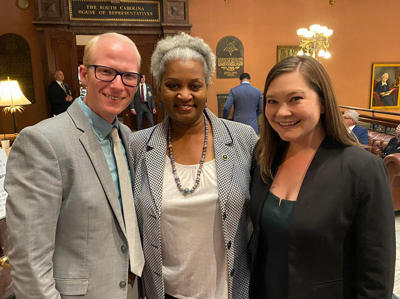
What a session. The second year of our two-year Legislative Session came to an end with a big bang! The South Carolina Legislature passed the School Lunch Debt (H3006) bill unanimously and the governor signed it into law. The law prevents school districts from sending students’ lunch debt to collection agencies statewide. It also stops them from adding interest or any other fees on top of existing debt.
“The fact that both the House and Senate unanimously voted in favor of my bill to end this practice shows that legislators, Republicans and Democrats, recognize the importance of ensuring that no child should face going hungry at school for fear of their parent’s inability to afford a school lunch,” said Rep. Wendy Brawley (D) Richland County, who sponsored the bill.
“H3006 is a great example of working with our advocates and our partners to positively change the school environment for vulnerable students. I couldn’t be more proud of all of our advocates who took action,” said Phil Ford, policy and advocacy consultant at Wholespire.
School districts are encouraged to apply for the USDA Community Eligibility Provision Program, a national program that provides free lunch, breakfast, and sometimes dinner for all students. It’s available for all qualifying school districts with many eligible school districts in South Carolina not participating at all.

Wholespire partnered with the Women’s Rights and Empowerment Network (WREN), Save the Children, and other partners to encourage Senators to support the bill. But, the network of grassroots advocates was instrumental in getting H3006 on Senators’ radar. Action alerts were emailed to all grassroots advocates and shared on social media resulting in a multitude of responses.
This success comes off the heels of Wholespire rebuilding relationships at the State House after an election year (2020) that resulted in a large percentage of new legislators, in addition to the Wholespire rebrand in 2021.
“We spent a lot of time letting our new legislators know who we are and what we stand for,” said Meg Stanley, executive director at Wholespire. “We also had to make sure all legislators understood that our new name did not change our work.”
The potential for more legislative success is yet to be revealed. If Governor McMaster signs the budget in a few weeks, thousands of South Carolinians could benefit from an updated proviso. We’ll announce that news as soon as the budget is signed!
Additionally, there were efforts to limit any nonprofit, schools, and others from offering diversity, equity, and inclusion (DEI) or implicit bias training. These bills could have resulted in the loss of nonprofit status or the loss of ability to receive state funding. Wholespire opposed these bills that would limit educational opportunities for South Carolinians and provided support to the myriad of organizations leading the efforts.
Wholespire strives to align state and local level advocacy with an equity component of our work. We aspire to have champions in policy-making positions, to influence policy changes that advance our mission and the work of Wholespire chapters, and to have diversity within our advocacy partners.
Would you like to become a Wholespire grassroots advocate? We will periodically call on you to contact your legislators and advocate for public health, schools, equity, and many other issues related to our mission. We will email you action alerts when we need your help. Sign up today!
